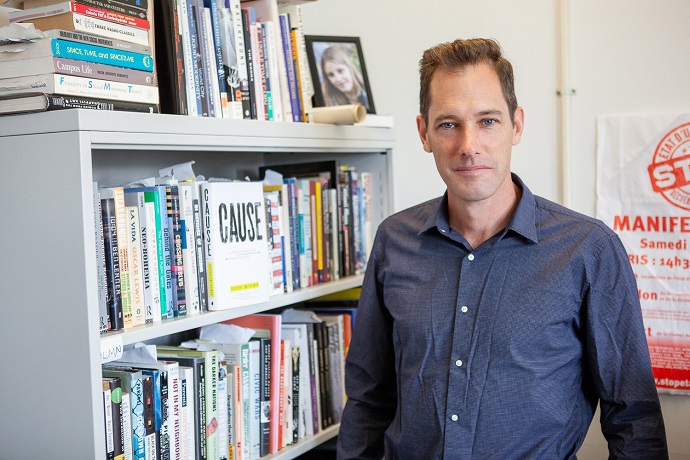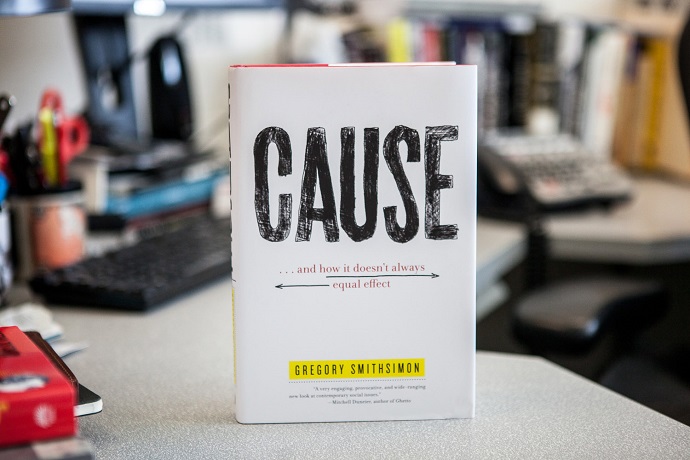Sociology Helps Distinguish Real News from Fake News Says Professor Gregory C. Smithsimon
Oct. 10, 2018
Smithsimon argues that scholars who study within the discipline gain valuable insights, skills, and tools to help them navigate a world where digital spaces like those found on social media often spread misinformation.

Professor of Sociology Gregory C. Smithsimon believes his discipline is key to filtering through the noise of information the public is being bombarded with in digital spaces.
As a sociologist, Professor Gregory C. Smithsimon is fascinated by the stories people tell others and the stories they tell themselves. In particular, he is interested in the stories people tell that are not true, but because they have been told so often and for so long that they are regarded as truth. To get to the root of this, and to encourage the reevaluation and interrogation of popular misconceptions, Smithsimon wrote Cause:…And How It Doesn't Always Equal Effect (Melville House, 2018).
In Cause, Smithsimon turns his attention toward three subjects that have dominated headlines recently—climate change, racism, and the war on terror—in a way that is as accessible as it is challenging. The book is purposefully written for a pop-culture audience.
"Sociology, as a field, hasn't really done a good job of taking all the stuff that we know and presenting it to the mainstream in a way that contributes to public debates," Smithsimon argues. "Sociology is race, class, gender, gender identity, sexuality, and ability. Those are the sorts of things that people are talking about. We do our disciplinary work really well. But we haven't written the kind of book that says, "Hey look, we've got answers and they may be different from what everyone has come up with, and we've got reasons for saying this."
His approach was inspired, in part, by another Brooklyn College faculty member, Ben Lerner, a CUNY Distinguished Professor of English, whose poetry encouraged him to consider a novel approach to his own work.
"In the social sciences, we talk about 'structure' all the time and that's valuable because kitchen-table discussion will ignore structure (e.g. the criminal justice system, families, etc.) and pretend that it's all about people's own initiative. And poetry is getting at something that is even finer than that: something that is true." Smithsimon says that what should also be considered is, "What happens when a parent dies? How does it feel when you're alone in a new city? What occurs at a certain moment in your life when everything changes? We, as social scientists, didn't have the instruments to detect those things. We didn't have the writing style to prove those things. And while there's not, as far as I recall, any poetry in Cause, it set me about the task of figuring how I could use other disciplines to understand things that were a little more subtle and integrate other perspectives."
Born in New Jersey, Smithsimon grew up in the suburbs just outside of Baltimore.

Smithsimon's Cause:…and How It Doesn't Always Equal Effect reexamines popular theories about the reasons for some social ills and uncovers surprising facts that point to other root causes.
As an undergraduate student, Smithsimon double majored in urban studies and visual arts at Brown University, sparked by his interest in how structures affect society.
"This was in the 1990s when being an urban studies major meant that you looked at a city, identified its problems, understood the root causes of said problems, and recognized that no one was going to do anything about those problems ever, and then you would move on to the next city."
At this time, the choices were going into planning to study buildings without the people, or sociology to study the people without the space. But he when he began his graduate study at Columbia University, ideas about how space shapes psychologies, and can create or diffuse tensions, began to take hold in the academic consciousness.
Smithsimon has since gone on to publish several books, including September 12: Community and Neighborhood Recovery at Ground Zero (New York University Press, 2011). He made a conscious decision to teach at CUNY because, he says, "CUNY has the best group of urban sociologists in the country. They are politically engaged, sharp, and they have what CUNY has had for the better part of a century now: people who are brash, who don't think of themselves as above the fray, and who want to be connected; people like Professor Sharon Zukin, who I had been citing my entire academic career and she teaches at Brooklyn College!"
The other draw for him is the students.
"They're not slackers," he says of Brooklyn College's budding scholars. "They're asking interesting, thoughtful questions. It's been a fantastic opportunity to be here. There's nothing really comparable to CUNY in the United States."
Smithsimon is currently working on a book about a suburban African-American community outside of Baltimore called Liberty Road, which will be released in 2019 by New York University Press.
"It's funny. I left the suburbs when I was 18 because they were so boring. I came back 18 years later to study them because they are so fascinating!"
But for his current work, Smithsimon has a specific hope—particularly in light of learning how large social media platforms have been utilized to present fiction as fact and spread false information in a way that has dangerous real-world implications.
"One of the ways sociology is useful to students is that it makes them better at evaluating information," he says. "When we don't have the tools to evaluate the information that's coming at us through our smartphones and social media, it leads to all sorts of dangerous territory. We wind up taking the information that reinforces our own prejudices and is designed to get us riled up even when there's no substance to it. I hope people come away from the book with a sense of how a sociological view of the world can help them find reliable, substantiated sources of information—which can help them understand the world better, can help them understand themselves better, and can be really liberating."






